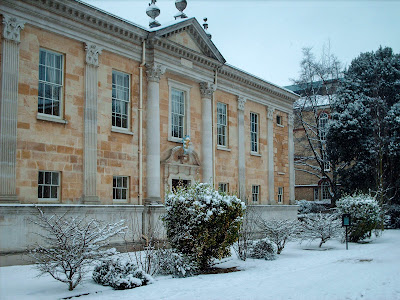IP Services from Barristers
Jane Lambert
Revised 16 May 2017
Some years ago, the Intellectual Property Office published a leaflet entitled "Choosing the Right IP Adviser". It contained a lot of useful information and I recommended it. However, there was one section that needed improvement and that was the one headed "IP Barristers" on page 6:
"IP barristers are likewise part of a wider profession and IP barristers give specialist advice in IP matters and conduct cases in Courts. The more experienced members of this group are generally able to provide a certain amount of business advice around IP too, although it is not normally their speciality."
Introduction to an IP Barrister will normally be through a solicitor, a patent or trade mark attorney or an accountant."
That information was incomplete, out of date and in some respects misleading. That leaflet has now been replaced by the web page Seeking intellectual property advice.
What is a Barrister?
According to the Bar Council:
"Barristers are specialist legal advisers and courtroom advocates. They are independent, objective and trained to advise clients on the strengths and weaknesses of their case. They have specialist knowledge and experience in and out of court, which can make a substantial difference to the outcome of a case."
I'd go along with that and would stress the adjectives specialist, independent and objective because therein lies our value. Those qualities enable us to advise very accurately how the law will apply to a particular situation and how best to avoid difficulties or exploit advantages.
But we have another advantage that our professional association does not mention. Most of the judges of the High Court are drawn from our number and it is they who declare the law. As we appear regularly before those judges as advocates and were often against them when they were at the Bar we get to know how they think. That enables us to forecast how the law will develop better than anybody and that is why patent attorneys, trade mark attorneys and even the biggest law firms instruct us.
What exactly does a Barrister do?
We advise on difficult points of law, draft complex legal instruments and represent parties in hearings before courts, arbitrators and other tribunals, in negotiations and in mediation.
We do not conduct litigation (that is to say, issuing proceedings. corresponding with the court or other side, interviewing witnesses and collecting documentary or other evidence), prosecute patent, trade mark or registered design applications or manage clients' general legal business like conveying property or proving wills. Litigation is done by solicitors or, in the case of intellectual property litigation, patent or trade mark attorney litigators. Solicitors also handle general legal business. Patent or trade mark attorneys (also known as patent or trade mark agents) prosecute patent, trade mark and registered design applications.
However, we often support solicitors and patent and trade mark attorney litigators in conducting litigation by advising on evidence, drafting or reviewing letters, statements of case (or pleadings), applications, orders, witness statements and affidavits and attending case management conferences and other hearings on procedural matters.
We also help solicitors manage their clients' non-contentious business by drafting letters, contracts, licences, terms and conditions and other documents. The reason they seek our help on non-contentious matters is that our courtroom experience helps us to spot potential pitfalls and take steps to avoid them in time.
Similarly, we assist patent and trade mark attorneys in patent, trade mark and registered design prosecution by advising on such issues as patentability and whether there is a risk of confusion and association with an earlier mark, drafting statements of grounds, counter-statements and witness statements and appearing at hearings before hearing officers appointed by the Comptroller-General of Patents, Designs and Trade Marks (also known as "the Comptroller", "Registrar" or "Chief Executive") in the Intellectual Property Office.
Because we are called in as and when we are needed we are often compared to consultant physicians and surgeons in medicine.
Do I really need to consult a Solicitor or other Professional to meet a Barrister?
No. That bit of the IPO leaflet is out of date and needs to be revised.
Until 2004 the only way a resident of England and Wales could consult a barrister was by asking a solicitor, patent or trade mark attorney or some other professional intermediary to arrange a meeting with a barrister known as a "conference" or by sending him or her written instructions to draft a document or advise in writing. That could be very slow and expensive and was not always satisfactory because not every solicitor or other professional intermediary knew whom to ask.
It is now permissible for members of the public to consult barristers directly under the Public Access scheme and there are sometimes advantages in doing so, especially in respect of intellectual property. Because we are independent and objective we can advise on the optimum legal protection for a new product or business. For instance, the instinct of a patent attorney is to recommend patent protection for a new invention and in as many countries as possible. Often, that is the best advice but when the inventor is an individual, start-up or small business more nuanced advice is required. If a client needs a patent or other registered right we can introduce him or her to a patent or trade mark attorney with exactly the right skills and experience for the job. Over the years we get to know a lot of patent and trade mark attorneys. solicitors and other professionals. We quickly learn who is good at one type of work and who is good at another.
We meet a lot of people in our work who would be useful to a new business such as angels, business mentors, chartered accountants, foreign lawyers, product design consultants, specialist insurance brokers and venture capital fund managers. We can put clients in touch with them.
Of course, it is still possible to come to us through a solicitor, patent or trade mark attorney or other professional intermediary and that is often the best way to approach us because a good solicitor or other intermediary will know the Bar and formulate precisely the question on which he or she needs advice. But you should be aware of public and licensed access for those cases when the intervention of a solicitor, patent or trade mark attorney or other professional intermediary is unnecessary.
How to choose a Barrister
According to the Bar Council, there are about 16,000 barristers. Theoretically, any of us can do any type of work but in practice we tend to specialize in one or more fields. There are a large number of barristers who include intellectual property work in a broader practice and there are some instances where that is an advantage but there are others, such as I, who do intellectual property and technology work and virtually nothing else.
The expression "horses for courses" is very apt when choosing a barrister. Always bear in mind that legal issues do not always fit neatly into specific categories, unlike exam questions. Sometimes, an intellectual property question arises in a commercial transaction such as the sale of a business or the winding up of a company. In those circumstances, you choose a barrister with knowledge and experience of the main issues who also knows about intellectual property. However, where the matter turns on a specific issue such as whether an invention is a computer program as such it is better to find a patent specialist with experience of computer law.
Most barristers practise in groups known as "chambers". These are not partnerships or companies but associations of barristers who club together to rent or buy office space, employ clerks, chambers administrators and other staff and acquire books, furniture and equipment. Some chambers specialize in intellectual property. Others, such as ours, have intellectual property departments consisting of practitioners who practise intellectual property either exclusively or as part of a wider chancery, commercial or entertainments law practice. Yet others are general chancery or commercial sets whose members include intellectual property in a wider practice.
You can get some idea of what a barrister can do by looking at his or her website. Check out the cases in which he or she has appeared, the books and articles he or she has written, the presentations he or she has given, whether he or she keeps a blog on the relevant area of law and so on. See whether he or she has been in the court or tribunal before which you or your client need representation recently, or whether he or she has written anything about the point of law on which you need advice or the document you need drafting. You can also get some information from his or her clerk and you can always give the barrister a ring or send him or her an email.
Further Information
If you want to discuss this email, call me on +44 (0)20 7404 5252 during office hours or send me a message through my contact form.




Comments
Post a Comment